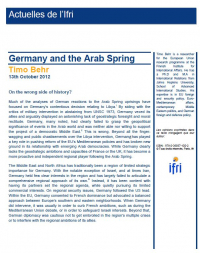Gateway to Think Tanks
| 来源类型 | Publications - Editorials - Actualité MOM |
| 规范类型 | 评论 |
| DOI | 978-2-36567-100-2 |
| Germany and the Arab Spring Actuelles de l'Ifri, October 2012 | |
| Timo BEHR | |
| 发表日期 | 2012-10-13 |
| 出处 | Actualité MOM |
| 出版年 | 2012 |
| 概述 | Much of the analyses of German reactions to the Arab Spring uprisings have focused on Germany’s contentious decision relating to Libya. By siding with the critics of military intervention in abstaining from UNSC 1973, Germany vexed its allies and arguably displayed an astonishing lack of... |
| 摘要 |
Germany and the Arab Spring Actuelles de l'Ifri, October 2012
Much of the analyses of German reactions to the Arab Spring uprisings have focused on Germany’s contentious decision relating to Libya. By siding with the critics of military intervention in abstaining from UNSC 1973, Germany vexed its allies and arguably displayed an astonishing lack of geostrategic foresight and moral rectitude.  Germany, many noted, had clearly failed to grasp the geopolitical significance of events in the Arab world and was neither able nor willing to support the project of a democratic Middle East. This is wrong. Beyond all the finger-wagging and public chastisements over the Libya intervention, Germany has played a key role in pushing reform of the EU’s Mediterranean policies and has broken new ground in its relationship with emerging Arab democracies. While Germany clearly lacks the geostrategic ambitions and capacities of France or the UK, it has become a more proactive and independent regional player following the Arab Spring. The Middle East and North Africa has traditionally been a region of limited strategic importance for Germany. With the notable exception of Israel, and at times Iran, Germany held few clear interests in the region and has largely failed to articulate a comprehensive regional approach of its own. Instead, it has been content with having its partners set the regional agenda, while quietly pursuing its limited commercial interests. On regional security issues, Germany followed the US lead. Within the EU, Germany consented to French dominance but advocated a balanced approach between Europe’s southern and eastern neighborhoods. When Germany did intervene, it was usually in order to curb French ambitions, such as during the Mediterranean Union debate, or in order to safeguard Israeli interests. Beyond that, German diplomacy was cautious not to get embroiled in the region’s multiple crises or to interfere with the regional ambitions of its allies.
Germany and the Arab Spring
|
| 关键词 | Arab Spring German foreign policy Germany |
| URL | https://www.ifri.org/en/publications/editoriaux/actualite-mom/germany-and-arab-spring |
| 来源智库 | French Institute of International Relations (France) |
| 引用统计 | |
| 资源类型 | 智库出版物 |
| 条目标识符 | http://119.78.100.153/handle/2XGU8XDN/415676 |
| 推荐引用方式 GB/T 7714 | Timo BEHR. Germany and the Arab Spring Actuelles de l'Ifri, October 2012. 2012. |
| 条目包含的文件 | ||||||
| 文件名称/大小 | 资源类型 | 版本类型 | 开放类型 | 使用许可 | ||
| capturebehr.jpg(47KB) | 智库出版物 | 限制开放 | CC BY-NC-SA |  浏览 | ||
| actuellebehr131012.p(178KB) | 智库出版物 | 限制开放 | CC BY-NC-SA | 浏览 | ||
除非特别说明,本系统中所有内容都受版权保护,并保留所有权利。